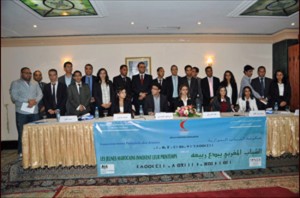International Political Forum
Posted by Mohammed Qasserras
Civil society in Morocco took a step towards better policies for young people through the creation of the Moroccan Parallel Youth Government MPYG, which intended to mimic and evaluate Morocco government policies.
Without a doubt, the formulation of the MPYG is the fruit of the constitutional reforms that Morocco has seen during epoch of the Arab Spring. This initiative sees Moroccan youth sit side-by-side with Benkiran Government to evaluate and implement Morocco public policies insisted upon in the new Morocco constitution (2011) with the aim of achieving a strong participatory democracy.
Young people constitute more than a third of the population, but policies related to youth development is still far behind. The latest report on youth unemployment, issued in February, said that more than a million people between the age of 16 and 34 were out of work.
Notably, the new government in 2012 expressed its commitment to developing an integrated national youth strategy and also opening a national dialogue and public debate on issues about youth and civil society, prompting fast movement toward bringing the Parallel Youth Government project to fruition.
What is Parallel Youth Government?
The Parallel Youth Government is a youth organisation that mimics the Government of Morocco. It is made up of 28 young members representing a number of Moroccan cities. Each member serves as the Parallel Youth Government minister for a certain government ministry. Also, the Parallel Youth Government conducts studies, makes policy recommendations and meets with the government ministers.
The project was initiated by the Moroccan Youth Forum (FJM-Morocco), an independent association led by a lineup of young people seeking to create a space for youth participation in the political sphere and promoting active citizenship.
Ismail Hamaraoui, the project’s General Coordinator, said: “the idea behind creating the MPYG came after my visit to Lebanon and meeting some members of Lebanese youth Government who told me about the initiative and I appreciated the idea.”
Ismail made sure to point out that this initiative did not adhere to any ideology or political party. “We are independent and our main concern is the interest of our country and its people”.
This project is designed to give young Moroccans a chance to be heard at the highest levels of government on a range of issues relevant to young people’s lives, said Ibtissam Azzaoui, Minister of Communication in the Parallel Youth Government.
Lahbib Choubani, Morocco’s Government and Civil Society Relations Minister, promised that the doors of the Parliament would be open for the Parallel Youth Government to attend meetings alongside Members of Parliament.
Members of the MYPG received training from law and public policy professionals with the aim of equipping them with the skills to effectively analyse and critique public policy.
So far, MPYG has held regular meetings with the heads of Moroccan Government to voice suggestions as well as submitting proposals and alternatives for a better development of youth policies.
MPYG member, Ibtissam Azzaoui, commented:
“MPYG is a civic initiative launched by the Morocco Youth Forum Association and it is not a studies office or representative or elected body and it does not claim the representation of all Moroccan youth, it is simply a youth initiative and its goal is not that symbolic title of ‘youth minister’, but enabling youth generations to acquire necessary mechanism, skills, tools and also gain the experiences understand public policies and get used to them. It is more a preparatory stage for youth to understand politics.”
Youth government notably has strong female representation, with women fill in 8 out of 17 ministerial positions, and with a female project coordinator.
Criticisms
Though it enjoys strong support, the idea has been attacked on social media: many young Moroccans took to Facebook to criticise the initiative’s emergence, linking it with Morocco’s Authenticity and Modernity Party who currently hold 47 of 395 seats in the country’s House of Representatives.
Many protestors of the February 20 Movement allegedly refused involvement in this project, arguing that it represents only the aristocratic classes of Morocco. MPYG members have a reputation among the protestors for being well-off young people who graduated from French institutes and are thereby not entitled to represent the youth of Morocco.








